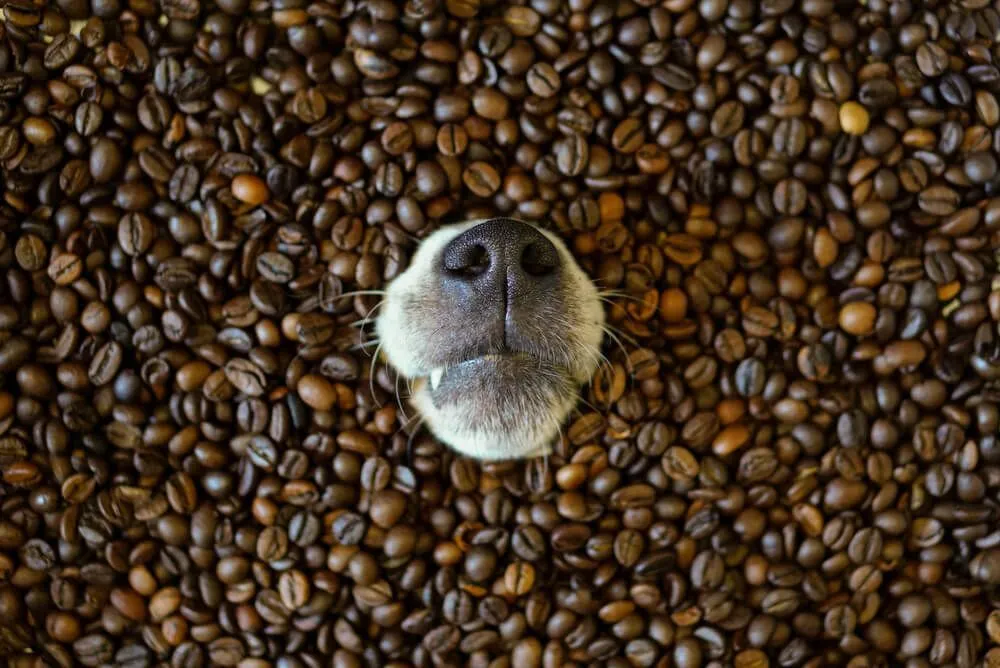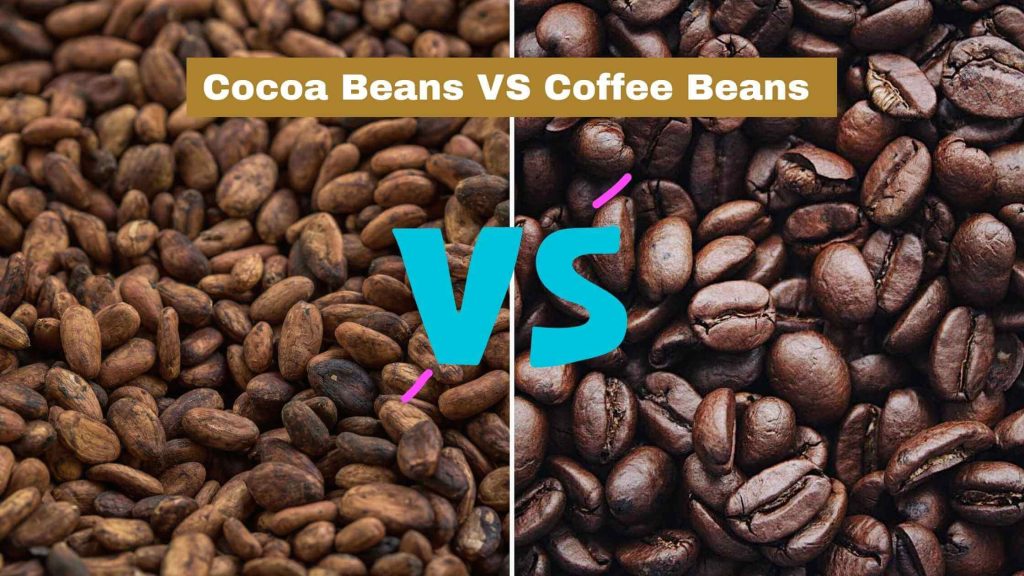Are you savoring your morning cup of Joe, delighting in the delightful taste as ice cream that gives you the perfect boost to start your day? However, as you reach for another coffee bean from the bag, your furry dog looks at you with innocent eyes, silently begging for a taste as Sweet potato pie. Before sharing a coffee bean with your canine friend, it is crucial to understand whether dogs can safely consume them. Is this coffee treat harmless fun or dangerous? Put an end to your curiosity by reading our enlightening article titled “Can Dogs Eat Coffee Beans? What You Need To Know.” We assure you that this read will be as refreshing as your favorite espresso shot but potentially much more significant as Cheddars Bourbon Glaze! Delve into the details that could help safeguard the well-being of man’s best friend.
The Dangerous Effects of Caffeine on Dogs’ Health
The world of dogs and humans can have amazing interactions. However, only some things that are good for us are good for our furry dog. Take caffeine, for example. It’s a popular stimulant enjoyed by many people worldwide, but it can be dangerous for dogs. Caffeine affects dog’s nervous systems and can lead to hyperactivity, restlessness, Vomiting, an elevated heart rate, or even death in severe cases. Dogs metabolize caffeine much slower than humans do, so they’re exposed to its harmful effects for longer periods. Even small amounts of caffeine can cause poisoning in dogs, with symptoms appearing within 2 to 4 hours after consumption.
Why Coffee Beans Should Never Be Included in a Dog’s Diet. Can Dogs Eat Coffee Beans? What You Need to Know
Dangers of feeding coffee beans to dogs, harmful effects of coffee beans on canine health, and potential complications from consuming coffee beans.
Feeding your dogs with coffee beans or any products containing caffeine can result in numerous health hazards. In extreme situations or when consumed excessively, it could trigger seizures or cardiac issues. Hence, it’s crucial to store your coffee beans where your canine dog cannot access them. Prioritizing their health and wellness by taking preventive measures is always wiser than regretting later.
If you’re looking for alternative treats for your pup that are safe and healthy, there are plenty of options available specifically made for dogs. From delicious dog-friendly snacks Avocado Egg Rolls to chew toys that promote dental health – there are plenty of ways to spoil your furry friend without risking their health with coffee beans.

Tips for Keeping Your Dog Away from Coffee Beans and Other Harmful Substances
Preventing access to coffee beans, dog-proofing your home from toxic foods, and training your dog to avoid dangerous substances.
Training your dog to resist coffee beans might seem like a difficult task, but employing multiple strategies can help. Safely store dangerous substances away from your pup, out of reach from his nose and mischief-filled paws, to ensure a low-risk environment. It may be more clever to replace dangerous items with safe favorites, such as stuffed toys instead of slippers or kibble instead of chocolate, as humans enjoy poppy seed muffins but no poppy flowers in sight.
Changing your behavior first is a tip that is often overlooked; dogs tend to take cues from their pack leaders.
Symptoms of Caffeine Toxicity in Dogs
Keeping your dog’s away from coffee beans is essential for their well-being as beef stew tripe. Dogs are highly sensitive to caffeine toxicity, and the effects can be concerning or even life-threatening. There’s also the possibility that your puppy will react unusually, such as barking aggressively or becoming skittish for no apparent reason.
Your canine companion can become tempted by the smell of freshly brewed coffee and dip into your unattended cup or pick up coffee beans on the floor! It is important for dog-proofing homeowners to consider making their homes caffeine-free as well.
Dog-Ingested Coffee Beans
Has your naughty dog ever pawed at a bag of coffee beans? The sweet aroma of fresh coffee might be irresistible to our four-legged friends, but the consequences could be dire – yes, our pets could get into some hairy situations when they encounter caffeine. Due to their inefficient metabolism of caffeine, dogs are more susceptible to its toxicity.
Dogs ingesting coffee beans can suffer from caffeine poisoning as a result.
Health Risks of Dogs Eating Coffee Beans
Coffee beans contain caffeine, a potent stimulant that can harm dogs. Caffeine’s impact on a dog’s body is significantly more pronounced than humans due to its smaller size and differing metabolism. Even small amounts of caffeine can trigger a cascade of adverse reactions as beef Ojyu , including an elevated heart rate, increased body temperature, tremors, seizures, and, in severe cases, cardiac arrest.
Dogs’ symptoms differ according to the amount of coffee beans they ingest, their size, and their overall health. Smaller dogs are particularly vulnerable, as even a single coffee bean can cause significant health complications. Additionally, dogs with underlying heart conditions or other health issues are at increased risk of severe reactions.

Chocolate Vs. Coffee for Dogs
A dog’s digestive system can be adversely affected by chocolate’s Theo bromine content, causing Vomiting, diarrhea, and abdominal pain. Due to their increased sensitivity to Theo bromine, puppies and smaller breeds are especially affected by these gastrointestinal disturbances.
In more severe cases, chocolate poisoning can lead to neurological complications. Theo bromine’s stimulant properties can cause hyperactivity, tremors, and seizures. In extreme cases, chocolate consumption can even result in coma or death.
Caffeine’s stimulant properties can overstimulate a dog’s nervous system, leading to restlessness, anxiety, and hyperactivity. Excessive caffeine consumption can even cause tremors and seizures.
Similar to chocolate, coffee can cause gastrointestinal upset in dogs. Caffeine’s loosening effect can lead to diarrhea, while its acidic nature can irritate the stomach, causing Vomiting.
Can Puppies Eat Coffee Beans
But have you ever wondered, can puppies eat coffee beans? Before answering that directly, let’s picture this – what feels like a heartwarming energy booster to us could be potentially harmful to our little ones. How so? The reason behind it is a certain bitter component of coffee called caffeine.
In spite of caffeine’s benefits for humans, it poses a toxic threat to dogs due to their incapacity to metabolize it. Additionally, it can trigger tremors, restlessness, and racing heart rates, which can be quite distressing for your four-legged friend.
Veterinary Advice About Dogs and Caffeine
Recognizing Signs of Caffeine Poisoning:
Swift recognition of caffeine poisoning symptoms is crucial for prompt veterinary intervention. If you suspect your dog has consumed caffeine, be vigilant for these signs:
– Restlessness, Anxiety, and Hyperactivity
– Increased Heart Rate and Panting
– Dilated Pupils
– Vomiting and Diarrhea
– Tremors and Seizures
– Collapse and Loss of Consciousness
Immediate Action in Case of Caffeine Ingestion:
Should you witness your dog consuming caffeine or suspect potential ingestion, act swiftly to minimize the severity of the situation:
Contact Your Veterinarian Immediately:
Time is of the essence in cases of caffeine poisoning. Call your veterinarian or the nearest animal poison control center without delay.
Induce Vomiting (if Recommended by Your Veterinarian):
Under the guidance of your veterinarian, induce Vomiting to expel the ingested caffeine. This should only be done if the ingestion occurred within the past 30 minutes and your veterinarian specifically advises it.
Prevent Further Caffeine Access:
Ensure your dog has no further access to caffeine-containing substances, including coffee, tea, energy drinks, and caffeinated foods.
Monitor Your Dog Closely:
Keep a watchful eye on your dog for any signs of caffeine poisoning. If symptoms worsen or new symptoms develop, seek immediate veterinary attention.
Preventing Caffeine Exposure:
Proactive measures to prevent caffeine exposure are paramount in safeguarding your dog’s health:
Secure Caffeine-Containing Substances:
Keep coffee, tea, energy drinks, and caffeinated foods out of reach of your dog as onion. Store them in tightly sealed containers in high cabinets or on countertops inaccessible to your pet.
Educate Family and Guests:
Inform your family members and guests about the dangers of caffeine to dogs. Please encourage them to be vigilant and ensure no caffeinated items are left within the dog’s reach.
Choose Dog-Friendly Alternatives:
Option for decaffeinated coffee and tea, or consider herbal teas specifically formulated for dogs.
Emergency Measures for Dog-Consumed Caffeine
The first step in handling this situation is to remain calm and assess the severity of the situation. If your dog has consumed a small amount of caffeine or a caffeinated beverage like coffee or tea, closely monitor their behavior for any signs of distress. A veterinarian should be contacted immediately if your dog shows any symptoms after ingesting a significant amount or ingesting a significant amount.
Make sure you provide your veterinarian or a poison control center with all the relevant information about the incident. This includes the type and quantity of caffeine consumed by your dog and any observed symptoms. They will be able to provide you with specific guidance based on your dog’s size, breed, and overall health condition.
While waiting for professional help or en route to the veterinary clinic, there are some general steps you can take to help your dog minimize potential harm from caffeine ingestion. These include inducing Vomiting (only if advised by a professional), offering water to dilute the caffeine concentration in their system (unless otherwise instructed), and keeping them calm and comfortable.
When it comes to our pets’ safety, prevention is always better than cure. If dogs are kept out of reach of caffeinated products, and they are unable to access them accidentally, emergencies like these will be greatly reduced.
Read more about What is Angus beef ? , Can you eat raw shrimp? , Hibachi vs Teriyaki , How Long Does Cooked Salmon Last in the Fridge?
FAQS
Can dogs consume coffee beans safely?
No, dogs cannot consume coffee beans safely as they contain caffeine which is harmful to them.
What happens if a dog eats coffee beans?
If a dog eats coffee beans, it may experience restlessness, rapid breathing, heart palpitations, muscle tremors, seizures and bleeding.
How much coffee is toxic to a dog?
Even small amounts of caffeine can cause detrimental health effects in dogs. As little as 1/10th of a gram per kilogram body weight could be lethal.
Is there an antidote for caffeine poisoning in dogs?
There isn’t an exact antidote for caffeine poisoning in dogs. Treatment generally involves inducing vomiting if ingestion was recent or administering activated charcoal to absorb any remaining toxins.
